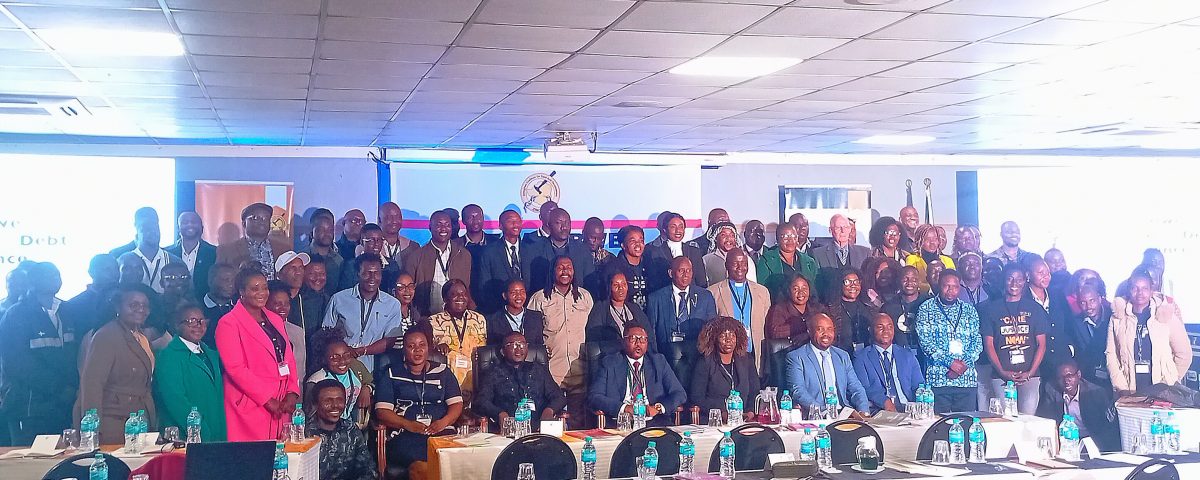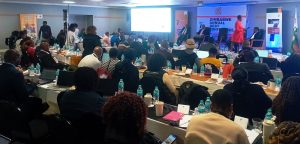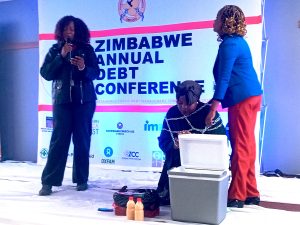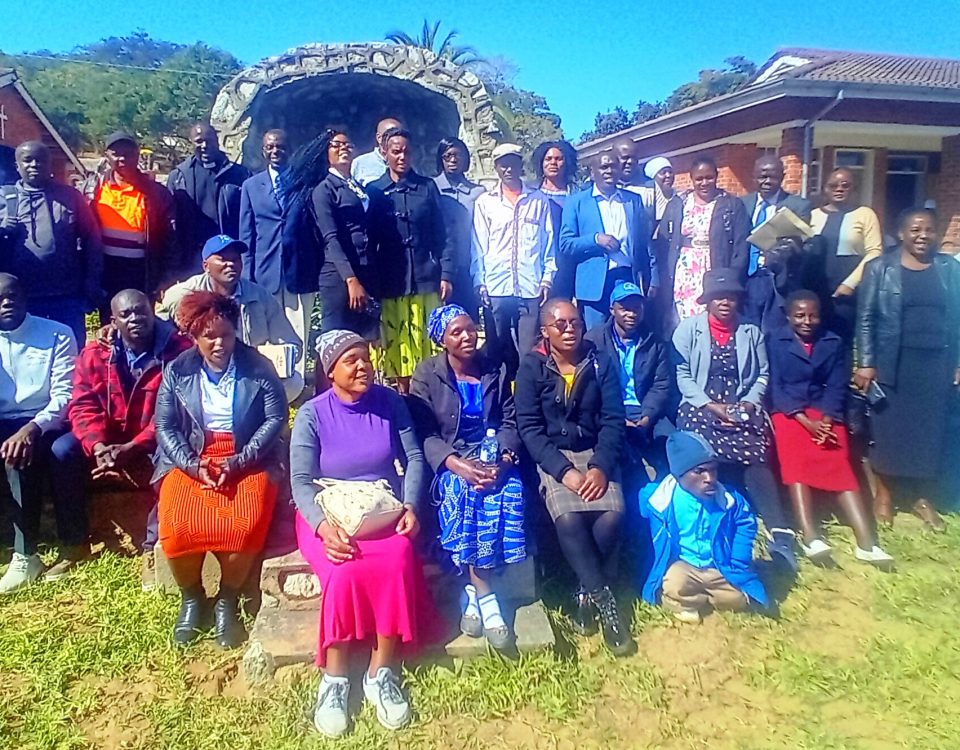
‘Industrialization will once again be revived in Mutare’s Nyakamete Industrial area’
July 2, 2025
The rise of Shadaya the ‘Iron Lady’ of gold mining in Manicaland
July 29, 2025Smith regime legacy debt must be written off as an odious debt: ZIMCODD

The participants of the 7th edition of the Zimbabwe Annual Debt Conference held in Mutare last week from Tuesday to Wednesday in a group photo.
Ngoni Dapira
A coalition of civic society organizations under the Zimbabwe Coalition on Debt and Development (ZIMCODD) has called for the cancellation of the US$700 million legacy debt inherited from the Ian Smith regime after independence as Zimbabwe’s debt crisis worsens staggering at US$21 billion.
This was highlighted last week Tuesday during the 7th edition of the Zimbabwe Annual Debt Conference, an annual conference organized by the socio-economic justice coalition, ZIMCODD and its partners. This year’s two days conference that ended last week Wednesday was held in Mutare running under the theme, “Sustainable public debt management towards vision 2030.”
It was hailed as the most successful symposium as it drew critical high level stakeholders from key government departments including the Office of the President and Cabinet (OPC), the Ministry of Youth Empowerment, Development and Vocational Training, the Ministry of Women Affairs, Community, Small and Medium Enterprises Development, the Parliament of Zimbabwe with parliamentarians from the portfolio committees on Budget, Finance and Investment Promotion and the Public Accounts committee, who presented in panel discussions. This was recorded as a milestone achievement on inclusive engagement showcasing the country’s commitment to collaborative problem-solving.
Local authorities were also represented by the host city’s deputy Mayor Councilor John Nyamhoka and Clr Michael Mabwe who heads the council’ business and economic development portfolio in Kadoma City Council. From the civic society organisations no one was left behind, the church, persons with disabilities, youths, women and climate change advocates, which also played a crucial role in panel discussions. Regional experts from the reputable Pan-African civic society organistaion African Forum and Network on Debt and Development (AFRODAD)and Afronomics Law also attended as well as representatives from UNICEF and Southern Africa Trust, a regional advocacy organisation that amplifies the voices and agency of the poor people in policy processes to reduce poverty and inequality in Southern Africa.

Workshop in progress as panelists explained how debt is crippling the nation.
In his opening remarks, ZIMCODD executive director John Maketo said the burden of legacy debts, compounded by recurring budget deficits, climate shocks and constrained revenue bases needs to be addressed through bold, homegrown and people-centered solutions. Adding that developing countries are currently paying a higher premium on concessionary loans, which is unjust.
“As ZIMCODD, we draw from the wells of Pan-African wisdom that no African country is truly free until economic sovereignty is reclaimed from exploitative debt systems and unjust global financial architectures designed to benefit few dominant nations and to perpetuate capitalism. Let us organize for debt justice, mobilize for equity and legislate for sustainability,” said Maketo.
Maketo said the call for debt justice is not a fight against the State, but a fight with the State for a democratic developmental State that is accountable, people-driven, inclusive in its planning and sovereign in its priorities, which is why they are calling for the cancellation of the US$700million debt inherited after independence from the Smith regime.
In a plenary session, Rangarirai Chikova from the Pan African Lawyers Union based in Kenya said the US$700 million debt which is now around US$2.5 billion present-day after interests is illegitimate and odious. “In historical debt accounting we need to make a distinction between what is legitimate and illegitimate. The $700 million debt is illegitimate. It was borrowed from private lenders and bilateral agreements without the consent of the majority black people and they did not benefit from it in the colonial State Rhodesia,” said Chikova.
Last year in November President Emmerson Mnangagwa commissioned a study to investigate the impact of British colonialism on Zimbabwe. The study is being conducted by the Zimbabwe National Elders Forum led by Dr Felix Mukonowengwe and other members include academics and clergy. It will be focused on colonial injustices suffered from 1890 to 1980, the year that Zimbabwe got its independence.
Chikova applauded the initiative by the President and said the study will help determine the quantum for reparations. He cited how in Kenya the United Kingdom (UK) government paid the Mau Mau fighters in the form of reparations and how the German government has agreed to pay about 1 billion Euros for the Herero-Nama genocide in Namibia as reparation.
Chikova further advised that government should litigate through the International Court of Justice and make use of the legal channels such as the United Nations Basic Principles and Guidelines on the Right to a Remedy and Reparation for Victims of Gross Violations of International Human Rights Law and Serious Violations of International Humanitarian Law. It outlines the rights of victims to receive redress for human rights abuses. He added that the principles emphasize that victims have a right to adequate, effective, and prompt reparation, including restitution, compensation, rehabilitation, satisfaction and guarantees of non-repetition.
Samantha Kanonyangwa a lawyer with Afronomics Law said Zimbabwe qualifies to appeal for the cancellation of the Smith regime debt as an odious debt. She said odious debts are not recognized as a principle under international law but can be used as a debatable doctrine which was established by Alexander Nahum Sack, a Russian lawyer and legal theorist. She said the doctrine theorizes that debts incurred by a despotic regime, without the consent or benefit of the people and with the knowledge of the creditors, should not be transferred to a successor government.
“So, Zimbabwe qualifies to call the $700 million an odious debt. There was no consent from the majority black Zimbabweans and even the creditors new that the money was not going to be used to benefit the majority of the people, but serve the white minority in Rhodesia back then. Most of it was used to amass weapons to suppress the liberation war, so on moral grounds we cannot pay that money. The Smith regime was a despotic government which was also illegitimate,” said Kanonyangwa.

A poetic skit during the conference that illustrated how debt is burdening women and the average Zimbabweans after money is spent on servicing debt at the expense of socio-economic developmental priorities.
She added that this year the African Union (AU) theme is around reparation which is why it is prudent for Zimbabwe to raise its case on the Smith regime odious debt inherited in 1980 and reparations for economic injustice caused by colonialism. In February the African Union (AU) declared 2025 as the “Year of Justice for Africans and People of African Descent through Reparations.”
Kanonyangwa gave an example of how the 1953 London Agreement cancelled 50 percent of the debt owed by Germany despite the anarchy created by the Germans in World War 1 and World War 11. “Following the debt cancellation, Germany experienced an economic miracle with large scale reconstruction and high rates of growth in income and exports. This can be our case as well as Zimbabwe,” she said.
The chief director in the Office of the President and Cabinet Anna Tinarwo concurred that Zimbabwe is in a debt distress situation but said everyone has a role to play in managing public debt and not leave it to government, which is why such forums are important for awareness and debate. She added that the National Development Strategy (NDS) 2 which will be drafted as an offshoot of NDS1 that ends this year will be people oriented unlike NDS1 which was a government blueprint.
“The OPC will just be providing policy guidelines but stakeholders will craft the major input in NDS2. This is in line with vision 2030 where we want a middle income society not a middle income economy. There is a difference there because economy is very broad,” said Tinarwo.
She said Zimbabwe’s $21 billion debt crisis was largely due to sanctions imposed on the country which saw them borrowing at exorbitant rates. Tinarwo added that through NDS1 government mainstreamed the issue of responsible borrowing which has helped contain the debt crisis and they intend to continue on that path through NDS2.
The declaration which was crafted by the stakeholders at the conference will be submitted to the OPC, Parliament of Zimbabwe and the Ministry of Finance, Economic Development and Investment Promotion. The coalition also called for a debt audit by the government and alignment of the Public Finance Management Act with the Constitution.
ZIMCODD announced that the 2026 conference will be held in Masvingo as they continue to rotate hosting the annual symposium.


